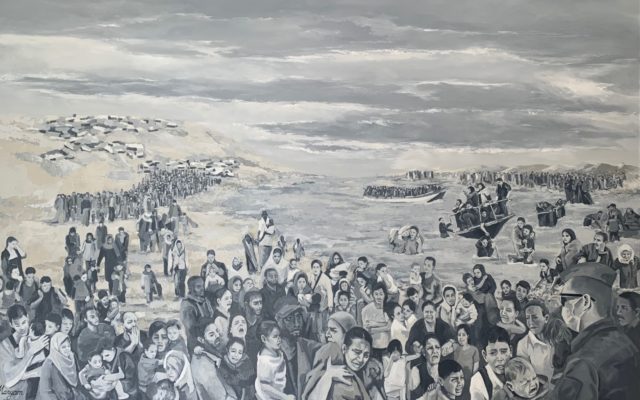Belonging everywhere and nowhere
UK for UNHCR’s Sara Whitehead discusses fleeing Iran and life in the UK.
18.12.24
© UNHCR/Viola Bruttomesso
At 17, Sara’s life in Iran was upended when her family made the difficult decision to leave. This marked the beginning of a journey that would shape her identity and inspire her to advocate for others facing similar struggles.
When Sara was forced to flee Iran, she had mixed feelings. Her whole life was in Iran, she had friends, family and something that made sense. But growing up, she was also familiar with the realities of a lack of certain freedoms. A part of her 17-year-old self was excited to be moving to a new country where she could dress how she wanted.
Sara and her mother initially left Iran to visit her brother studying in the UK. Packed for only a few weeks, they never expected their departure to be permanent. Her mother, a political activist, faced increasing risks at home, and staying in the UK became their only option for safety. Sara reflected that their ability to seek asylum while abroad spared them the dangerous routes many refugees endure.
Leaving without proper goodbyes was one of the hardest parts. In the 1990s, before smartphones and social media, maintaining connections was a challenge: “I only had the chance to tell one friend I wasn’t coming back,” she recalled, describing emotional phone calls and months of waiting for letters.
Adapting to a new country
The cultural and emotional challenges of adjusting to life in England were immense. In West London, Sara attended a diverse school but still felt like an outsider. “I was ashamed of my refugee status (…) of having asked for asylum and being a refugee” she admitted, struggling to reconcile her past with her new reality.
Language and cultural differences added another layer of complexity, she worked tirelessly to blend in by watching the BBC news and mimicking their accents, surprising classmates with how quickly she adapted to the culture.
Despite these efforts, the stigma of being a refugee weighed heavily. “There was never a positive narrative around immigration and being a refugee,” Sara said, as society frequently painted refugees as burdens rather than contributors – something still seen today. It wasn’t until much later, when she began working for UK for UNHCR, that she embraced her story and used it as a source of empowerment.
A life of advocacy
Today, Sara channels her experiences into meaningful work as a Philanthropy Manager at UK for UNHCR. Her role allows her to support displaced people worldwide while challenging the narratives that once shamed her. She exclaims that “We really put the refugee voice at the centre of everything that we do, it’s not just a slogan.”
Sara’s journey also underscores the resilience of refugees, a quality she admires deeply. “I think one of the reasons I feel so passionately about the work that we do is that behind the numbers are individual stories,” she said, emphasising that being able to help only one person is still one person’s life you’ve changed. For her, this work isn’t just a job; it’s a way to give back and stand in solidarity with those facing unimaginable hardships.
Belonging everywhere and nowhere
When asked how she identifies today, Sara offers a poignant answer: “I belong everywhere and nowhere at the same time.” After over 30 years in England, she calls it home but still feels the echoes of displacement. Yet, this has become her strength, blending cultures and experiences into a unique perspective that informs her advocacy and inspires others.
Sara’s story is a reminder of the resilience required to rebuild a life from scratch and the importance of compassion in supporting those who must. Through her work and her journey, she has become a voice for the millions of refugees striving for safety, dignity, and a place to call home.
—
Inspired by Sara’s story? Make a donation today to UK for UNHCR today to help us support forcibly displaced people around the world.




